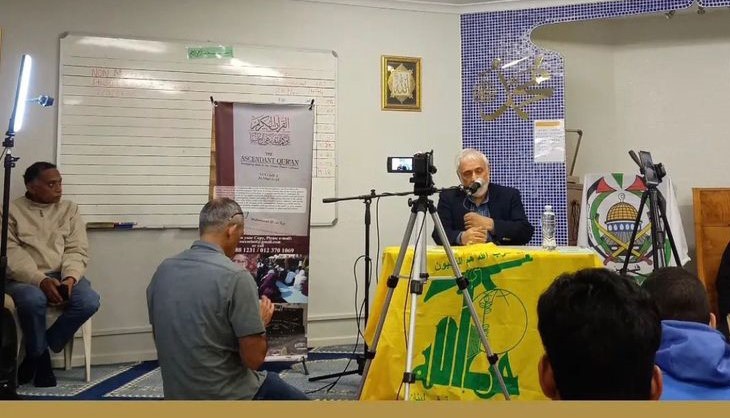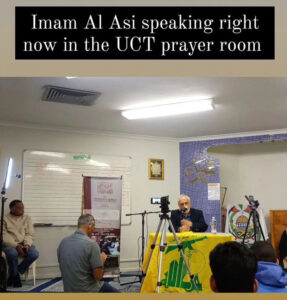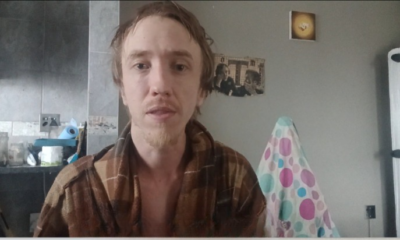
News

UCT shrugs off outrage over antisemitic cleric
The University of Cape Town (UCT) has once again allowed the flags of terrorist organisations to be draped on its campus and a recognised antisemite and extremist to address students.
According to the Anti-Defamation League (ADL), Imam Mohammed Al-Assi, “a Muslim activist based in Washington DC has made numerous antisemitic speeches around the country for several years”. Yet he was allowed to speak in the UCT Prayer Room on the evening of 15 May at the invitation of the UCT Palestine Solidarity Forum (UCT PSF).

This is according to the organisation’s social media, which also shows Al-Assi with representatives of the UCT PSF and Stellenbosch University PSF. The event came after UCT allowed the PSF to drape Hezbollah and Hamas flags in one of its lecture halls while members of terrorist groups Hamas and Palestinian Islamic Jihad (PIJ) addressed students via a video call from Iran. This was on 20 March during so-called “Israeli Apartheid Week” (IAW).
The ADL says that Al-Assi is a research fellow at the Institute of Contemporary Islamic Thought (ICIT), a pro-Iranian, pro-Hezbollah Islamist think tank that distributes antisemitic propaganda in its magazine, Crescent International. He has said, “The twin evils in this world are the decision makers in Washington and the decision makers in Tel Aviv” and “we have a psychosis in the Jewish community that is unable to co-exist equally and brotherly with other human beings”.
Erin Dodo, the chairperson of the South African Union of Jewish Students (SAUJS) Western Cape, says, “Once again, SAUJS is repulsed by the PSF’s outright support of the PIJ – the terrorist organisation responsible for last week’s attacks on Israel. In a period of four days, the PIJ fired 1 500 rockets at Israel – funded by Iran.
“Mohammed Al-Assi, the PSF’s most recent champion, has been flagged by the ADL for violent antisemitism, extremism, and radicalism. Publicly swearing his allegiance to the Iranian Supreme Leader [Ayatollah Ali Khamenei] in 1994, Al-Assi is also known for surrounding himself with the likes of Nazi sympathisers that smuggled money to Al-Qaeda, and Holocaust deniers.
“In the words of Al-Assi in an essay titled, “The Koran says: Zionist Israel will be shattered”, he writes about a final battle between Muslims and Jews in which “Muslims will deal the deathblow to Yahud [Jews].”
“For the PSF to continue to say that its mission is to defend the Palestinian people is insulting to the plight of Palestinians,” says Dodo. “Its mission is to spread antisemitic rhetoric and hatred cloaked in piteous activism.”
Al-Assi has also expressed his support for the Iranian religious edict calling for the death of British author Salman Rushdie. He accuses Israel and Jews of knowing about September 11 beforehand. The antisemitic tropes he has employed include accusing Israel of having a sinister global power; claiming Zionist control of the United States government; and saying that Jews and Zionists have manipulated books and history. He has stated that “the Zionists only understand the languages of explosions [and] bombs”, and spoke of the need for people to take up arms against Zionists and Israel.
“The fact that hate preachers such as Mohammed Al-Assi continue to be welcomed at UCT is deeply disturbing and continues to violate the International Holocaust Remembrance Alliance definition of antisemitism,” says South African Zionist Federation (SAZF) spokesperson Rolene Marks.
“Our universities should be places of rational debate and inclusive engagement, not hostile environments which encourage the dissemination of propaganda from extremist organisations such as the PIJ, Hamas, and Hezbollah – all three of which have made regular appearances on campus this year without condemnation. Places of learning in South Africa must be clear on the dangers of incitement and hosting speakers who would call for the discrimination against Jewish people and the destruction of Israel.”
After the terrorist organisation representatives spoke on 20 March, UCT spokesperson Elijah Moholola said, “UCT is aware of an event hosted by one of the students’ societies on campus … concerns around the speakers were raised by another students society prior to the event. An engagement followed between the two students’ structures on this matter.”
He went on to say that it wasn’t “an institutional event, but one hosted by a students’ society”.
At the time, Dodo said, “This has an impact on the safety of Jewish students and students in general. These speakers are known to have a long list of crimes that they and their organisations committed. Welcoming them on campus compromises everyone’s safety, and makes UCT a place for violence to be excused.”
Also at the time, the South African Jewish Board of Deputies (SAJBD) engaged with the university, saying, “The SAJBD finds it bewildering that UCT has so palpably failed to stand by its statement of values in which a firm commitment is made to ‘build an equitable social order based on respect for human rights’.”
Now, Cape SAJBD Executive Director Daniel Bloch says, “UCT is still busy with its internal investigation into IAW. After a high-level meeting with the Acting Vice-Chancellor Professor Daya Reddy, we asked it to issue a statement distancing itself from terrorist organisations and apologising to all students who felt unsafe on campus during IAW.
“We were made aware of Imam Al-Assi’s lecture at UCT prior to his visit. It was advertised that he would present on mental wellness. We take note of the display of a Hezbollah flag during his lecture, and will continue to engage with UCT accordingly.”
Regarding Al-Assi’s visit, Moholola says, “UCT reiterates that events hosted by any of the many recognised structures on campus – in this case by a students’ society – are not institutional events. It should further be noted that UCT management isn’t involved in the speakers’ invitation process for events hosted by staff and/or student structures who are autonomous in this context, nor does management necessarily align with any views held or expressed by any invited speaker.
“UCT is at this stage not aware of any complaints or concerns raised through formal university channels around the event in question.”
But the SAZF released a statement last month referencing the fact that an investigation had been requested into student societies hosting terror-cell representatives on campus on 20 March. The SAZF said on 16 May that it wasn’t free to disclose the findings of this investigation, and the media must contact the university directly for comment.
In response, Moholola says, “UCT has engaged with the organisation via the relevant university departments and/or processes. The university has provided the relevant feedback directly to the organisation.”










